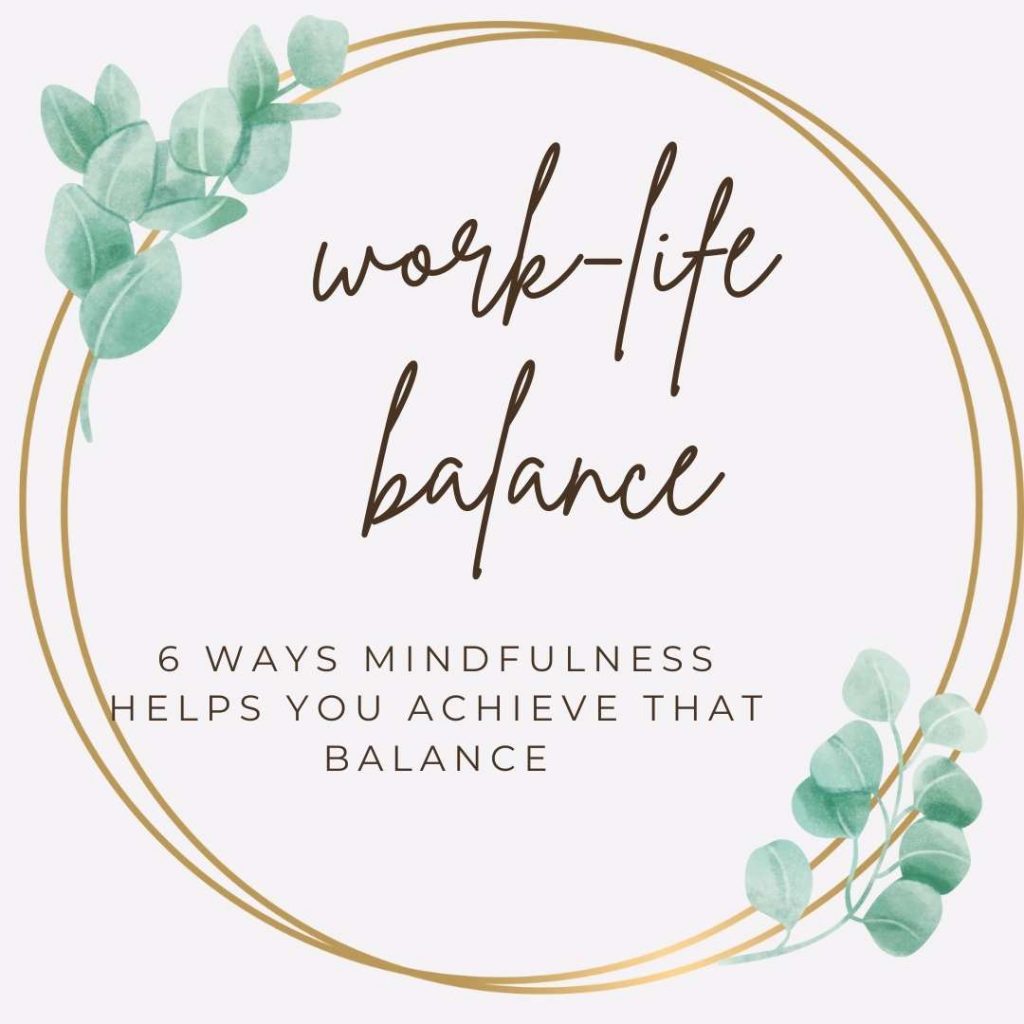

There are so many different benefits to learning and practicing mindfulness. For example, do you know about mindfulness for work-life balance? So many of us struggle to balance our obligations with our joys in life, our personal and professional time. This balance is so critical to our total wellness. Mindfulness is one way to help create that balance.
We Each Crave Work-Life Balance
Life can often feel like a race. Some of us treat it like a sprint. Others see it as a marathon. Either way, there’s competition, pressure, and a finish line. This viewpoint can alter our work- life balance. Juggling our job and personal life gets trickier by the day.
The pandemic worsened this for many people, as parents tried to manage working from home with raising and schooling children at home. Even before the pandemic, work-life balance was a struggle because the 21st century workplace often invades our personal time with emails, text messages, social media, phone calls, etc.
Although society has normalized a lack of balance, we truly crave it. When these elements are out of balance, it can create situations like:
- Poor physical and emotional health
- Neglecting important relationships
- Decreased performance of both work and home tasks
- Constantly feeling stress, often due to lack of time
- Overwhelm, tiredness, fatigue, and irritability
- An overall sense of life passing us by
Mindfulness for Work-Life Balance
What does it mean to practice mindfulness for work-life balance? Don’t worry; if mindfulness isn’t already a regular practice, it’s not nearly as intimidating as you might suspect. Mindfulness is simply about taking as many opportunities as possible to bring your awareness to the present moment.
1. Be Where You Are With Mindfulness
You know the feeling of being where you aren’t. You’re working on a project but thinking about how your boss will respond to it later. Perhaps you’re at your desk, but you’ve got your phone out to check social media. How many of us spend “now” writing to-do lists for “later”?
This can significantly throw off our work-life balance. If you’re spending time with your kids but your mind is on your work, then you aren’t fully appreciating the relationship in front of you. If your only friends are actually work acquaintances because you never leave the office, then you might not feel socially fulfilled. And if you’re alone time is interrupted with thoughts of where else you should be, then you aren’t refilling your own emotional well.
Mindfulness for work-life balance is all about learning to be at work when you’re at work and at home when you’re at home.
2. Surprisingly, This Prepares You For Tough Times
As we learn to enjoy the pleasant experiences, we also train ourselves to deal with tougher moments. This seems counterintuitive, especially to people pros to symptoms of anxiety. We tend to believe that we can “think through” problems in order to prevent them. However, usually we end up causing ourselves unnecessary worry, stress, and strife when we constantly think about what “could” happen.
Instead, use mindfulness for work-life balance to be present with that’s really happening. Instead of allowing your mind to run through a million different scenarios, you learn to better deal with what’s happening in the here and now. Sometimes this allows you to find solutions to problems. Other times, it allows you to recognize that you simply need to breathe and allow your feelings to pass.
3. Honesty and Authenticity In All Areas
The more we accept the present moment, the more we understand our needs. When we’re not distracted by other things, our feelings are front and center. As a result, we become better equipped to evaluate how our work life makes us feel. We can better grasp how our personal life impacts us. It all becomes evident to our senses. Empowered with this honest awareness, we become motivated to make changes that allow us to live more authentically in all areas of our lives.
4. Mindful Communication In All Settings
At work or at home, communication is key. Mindfulness helps to improve communication in all areas. On the job, you may find yourself moving a little more slowly when sending that email, checking to see that you’ve understood the situation and are expressing yourself in the best possible way.
Similar, around the house, you’ll stop simply reacting to situations. You’ll respond from a place of awareness, presence, and honesty, rather than from reflexive emotions. As you learn to be present with what is, you’ll become a better listener, too.
5. Self-Care Is Critical For Work-Life Balance
Living a whole, authentic life means that you take care of your own needs. These include your basic needs. When you use mindfulness for work-life balance, you embrace the moment, feel it fully, recognize your needs and can then meet them. You’ll know when you’re tired or stiff. This will inspire more stretching, eating slowly, staying hydrated, taking breaks, etc.
It becomes a beautiful cycle. More awareness leads to more self-care. Self-care brings out the best in you. The best version of you is more likely to stay in balance. As you see and meet basic needs, you become aware of higher and deeper needs, too.
6. Mindfulness for Work-Life Balance Enhances Creativity
Being mindful puts you in a position to expand your creativity. In the moment, you can be flexible and open. Your ability to innovate and improvise improves. Whether you are at work or home, you will benefit greatly from enhanced creativity.





One thought on “Mindfulness for Work-Life Balance”
Comments are closed.